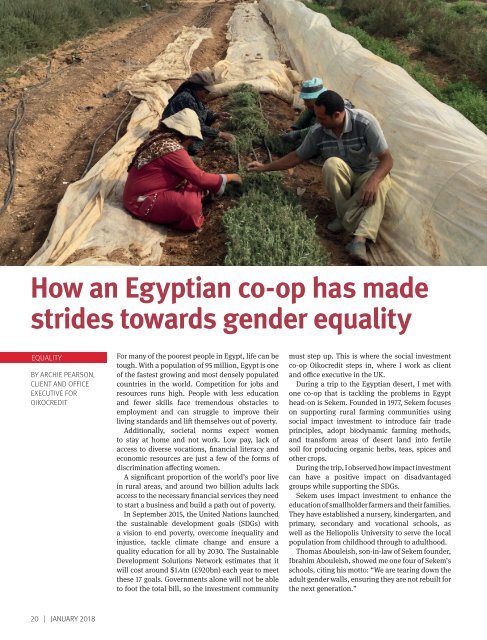JANUARY 2018
The January edition of Co-op News: connecting, challenging and championing the global co-operative movement. This issue explores finding the route to collective decision-making. It also looks at gender equality, co-housing for homeless veterans and what 2018 holds in store.
The January edition of Co-op News: connecting, challenging and championing the global co-operative movement. This issue explores finding the route to collective decision-making. It also looks at gender equality, co-housing for homeless veterans and what 2018 holds in store.
Create successful ePaper yourself
Turn your PDF publications into a flip-book with our unique Google optimized e-Paper software.
How an Egyptian co-op has made<br />
strides towards gender equality<br />
EQUALITY<br />
BY ARCHIE PEARSON,<br />
CLIENT AND OFFICE<br />
EXECUTIVE FOR<br />
OIKOCREDIT<br />
For many of the poorest people in Egypt, life can be<br />
tough. With a population of 95 million, Egypt is one<br />
of the fastest growing and most densely populated<br />
countries in the world. Competition for jobs and<br />
resources runs high. People with less education<br />
and fewer skills face tremendous obstacles to<br />
employment and can struggle to improve their<br />
living standards and lift themselves out of poverty.<br />
Additionally, societal norms expect women<br />
to stay at home and not work. Low pay, lack of<br />
access to diverse vocations, financial literacy and<br />
economic resources are just a few of the forms of<br />
discrimination affecting women.<br />
A significant proportion of the world’s poor live<br />
in rural areas, and around two billion adults lack<br />
access to the necessary financial services they need<br />
to start a business and build a path out of poverty.<br />
In September 2015, the United Nations launched<br />
the sustainable development goals (SDGs) with<br />
a vision to end poverty, overcome inequality and<br />
injustice, tackle climate change and ensure a<br />
quality education for all by 2030. The Sustainable<br />
Development Solutions Network estimates that it<br />
will cost around $1.4tn (£920bn) each year to meet<br />
these 17 goals. Governments alone will not be able<br />
to foot the total bill, so the investment community<br />
must step up. This is where the social investment<br />
co-op Oikocredit steps in, where I work as client<br />
and office executive in the UK.<br />
During a trip to the Egyptian desert, I met with<br />
one co-op that is tackling the problems in Egypt<br />
head-on is Sekem. Founded in 1977, Sekem focuses<br />
on supporting rural farming communities using<br />
social impact investment to introduce fair trade<br />
principles, adopt biodynamic farming methods,<br />
and transform areas of desert land into fertile<br />
soil for producing organic herbs, teas, spices and<br />
other crops.<br />
During the trip, I observed how impact investment<br />
can have a positive impact on disadvantaged<br />
groups while supporting the SDGs.<br />
Sekem uses impact investment to enhance the<br />
education of smallholder farmers and their families.<br />
They have established a nursery, kindergarten, and<br />
primary, secondary and vocational schools, as<br />
well as the Heliopolis University to serve the local<br />
population from childhood through to adulthood.<br />
Thomas Abouleish, son-in-law of Sekem founder,<br />
Ibrahim Abouleish, showed me one four of Sekem’s<br />
schools, citing his motto: “We are tearing down the<br />
adult gender walls, ensuring they are not rebuilt for<br />
the next generation.”<br />
20 | <strong>JANUARY</strong> <strong>2018</strong>


















